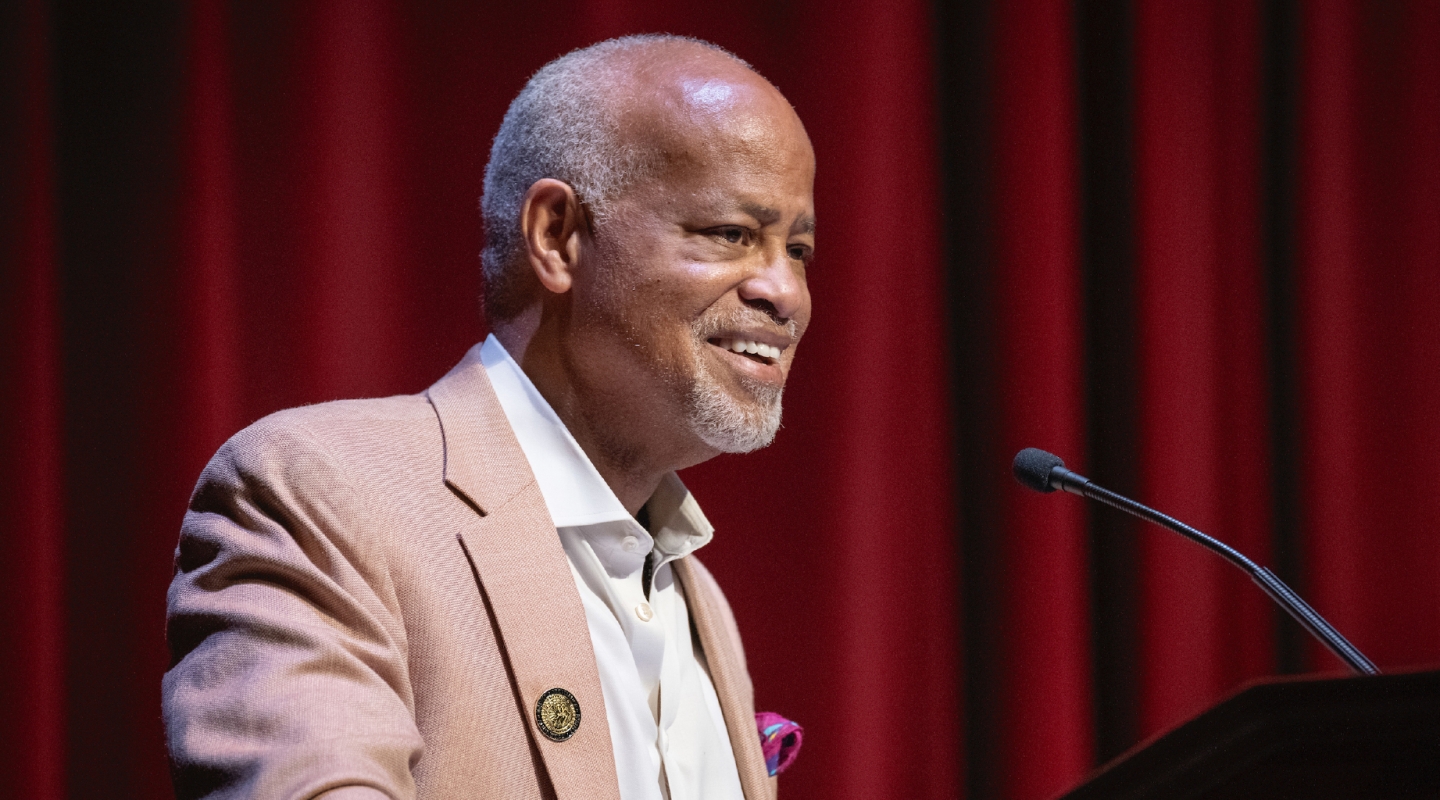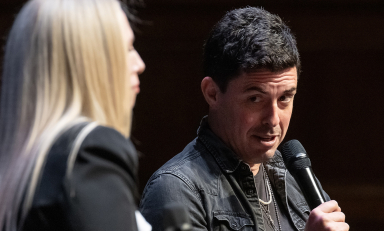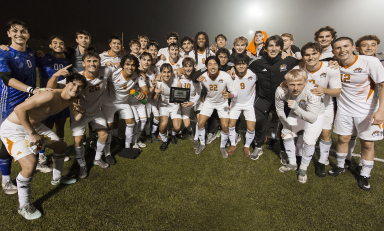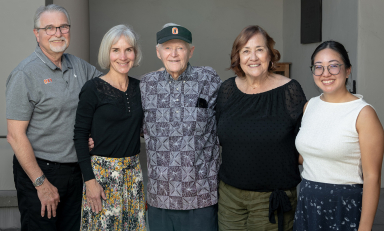After four years at the College, President Harry J. Elam, Jr. will depart next June—but he has a full agenda as The Occidental Promise comes into focus
On August 22, days before the start of the new academic year, President Harry J. Elam, Jr. shared some unexpected news with the Occidental community: “I was recently diagnosed with Parkinson’s disease, a neuro-degenerative movement disorder. Please know that I am doing well, with excellent medical care and a strong support system. But in order to prioritize my health and time with family, I have made the difficult decision not to serve the final year of my five-year term as president. June 30, 2024, will be my last day.”
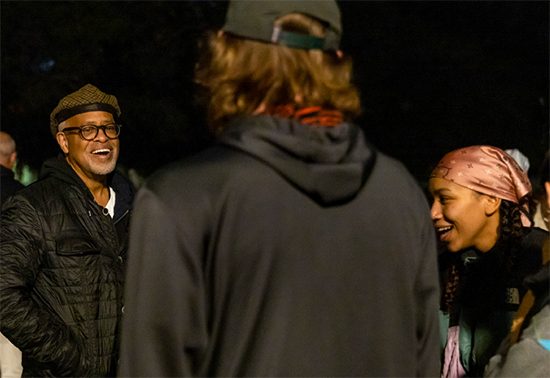
In the aftermath of his announcement, “The community’s response was wonderful,” he says. “The compassion and empathy I’ve felt is very much true to what we try to be about at Oxy. I’ve heard from students and parents, and I’m appreciative and thankful. I wish I could be here longer.”
On October 20—at the start of an event-filled Homecoming and Family Weekend—Elam sat down with Occidental magazine editor Dick Anderson to discuss his priorities for the coming months.
First of all, how are you doing?
I’m doing well. As a lot of people know, Parkinson’s is a slow-moving degenerative disease, which is a good thing. And I’m happy with my doctors. A lot of exciting things seem to be happening in the world of Parkinson’s, so I’m hopeful about that, but I know that stress is a key factor.
Having brought The Oxy Campaign For Good to a successful conclusion, how do you feel it has changed the College?
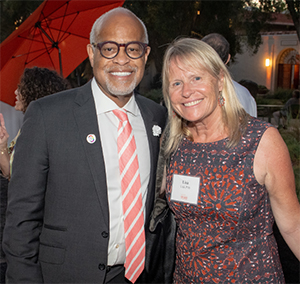
There are some concrete ways, such as supporting new endowed professorships. That’s going to make a difference as we look to grow our faculty. Also, we’ve made renovations to buildings so that the campus looks all the better and can do more, trying to accommodate space needs for everything from music to chemistry. We’re still working on funding for Norris Hall. It hasn’t been easy to achieve, but we’re committed.
Every new endowed scholarship will make a difference in what we can do in having the kind of socioeconomic diversity that we want as part of the Oxy experience. In terms of athletics, we’ve added several assistant coaches, and we have a new turf.
The College is also doing more to support students’ mental health and well-being through the support of several generous donors. That’s already making a difference in working to be preventative and proactive rather than just reactive.
Finally, we’ve seen Oxy’s endowment over the time I’ve been here go from $400 million to around $600 million. Out of all the money raised through the campaign, about $150 million is earmarked for the endowment—and that’s going to make a substantial difference in everything we do.
What are your priorities this year?
With The Occidental Promise, we are working on ensuring academic excellence. That has us working on faculty retention and recruitment and building up our tenure-track faculty. We’re also developing a first-year program that includes practical experiential learning. We already offer immersive courses as part of our curriculum—like Campaign Semester or the Oxy at the U.N. program—but how can we scale our efforts so that we can develop different experiences for each incoming class? We’re looking to partner with the faculty so that we can make some concrete impact by the end of the academic year.
Another platform of The Occidental Promise is educating the whole student. And that includes addressing the concerns of transfers and also the experience of first-gen students when they arrive as those numbers continue to grow over time. With veterans, how do we help them transition as well? We have a committee under the Division of Student Affairs looking at these questions and by the end of the year we’re going to have answers as to how we’re going to work with those students as they progress through Oxy.
Like the Class of 2024, you arrived at Occidental just after the outset of the pandemic. Do you feel the College has fully recovered at this point?
We’re further along in many ways but “Not yet” is the answer. But I’ll start with a story. I was out in the Quad when the trustees were meeting in October, and three students came over to talk to me. One was a junior and the other two were seniors, and I asked them that same question. And their feeling was that it’s taken a long time to return this sense of community that existed prior to the pandemic. The classroom experience has gone through changes as well in terms of coming back into the classroom and potentially a different type of pressure or rigor. That’s been an adjustment for students. Socially and academically, there’s been progress but we still have a ways to go.
Are there conversations about how AI is affecting the classroom experience—for better or for worse?
Yes. There’s a committee headed by Wendy Sternberg [vice president for academic affairs and dean of the College] to look into that question. Also, the Center for Teaching Excellence is looking at it from the angle of how to pick up if students are using AI in ways they shouldn’t.
From another angle, AI could really personalize the process of education and learning. Can we find ways to use it that can augment a variety of courses? Professor Kathryn Leonard in computer science is interested in exploring this question as well as whether Occidental, as a small liberal arts college, can do some things that big research schools can’t do in the classroom using AI. So, we shall see.
One of your most significant contributions to Oxy has been the emphasis on a culture of care. What does that mean to you?
The basic idea behind a culture of care is showing a compassion for everyone who’s part of the Oxy community and beyond—that we can find pathways out of mutual respect to really care for each other, even as we may have differences of opinions on issues. More than that, the culture of care is asking: What type of college do we want to be—and what are our values?
I think the idea of the culture of care does resonate with students, but it has to resonate with everybody in the Oxy community. These are emotionally trying times, where people have very strong opinions. If ever we needed a culture of care, it’s now.
We touched a little bit on the physical plant, but what will it take to address structural needs for science, music, media arts and culture, computer science?
One of the things I’d like to facilitate before I leave is a master plan: What do we want the campus to look like in 10 years, and what’s the path to get there? The master plan will also bring in questions of landscape, deferred maintenance, and landscape issues related to sustainability. We’ve got a lot of grass to water here. Can we do better with native plants while maintaining the beauty of our campus?
In terms of our academic programs and departments that are growing and thriving, media arts and culture has outgrown its space; that’s something we have to address. Same thing with computer science—and it’s exciting what’s happening with music. Down the line there will be another capital campaign, and I’m striving to do all that I can to leave Oxy in a good place for the next president.
The search process is under way to identify Oxy’s 17th president. What advice would you give the search committee?
To be honest, I want to stay away from giving them advice. They have to make a decision on what they think is best for the College. What I see myself doing is leaving things in a good place for the next person to pick up. One thing that happened with Jonathan Veitch is that he never really tried to influence or second-guess what was happening. He didn’t do it. So, I want to be like that. At the same time, I hope I can provide any information that’s helpful to my successor once they’re in place. But the decision really is up to the trustees.
Based on your own experience, would you say that Occidental was as advertised?
Yes. But it was even better than advertised. In terms of amazing students, dedicated faculty, innovative ideas, and people willing to collaborate and work together, all those things were better than I expected.
Is there a day or a memory that stands out to you?
I’d say Commencement last May. Isabel Wilkerson’s speech was called one of the year’s best graduation speeches [by The Guardian newspaper], so there was that. But there was also the feeling that maybe we were not totally over the pandemic but that we’re going to be more than all right. It wasn’t just a sense of surviving, it was moving into a new category of being prepared to thrive. So that stood out to me.
Let me share another story. We’ve done the Moonlight Breakfast for the last few years. It’s wonderful to see 400 students lined up for pancakes served by the senior staff, but my colleagues stopped me from serving anymore because I was asking students too many questions.
I heard you were holding up the line.
Right (laughs). Instead, I walked the line and talked to people about what they’re studying and how they’re feeling getting ready for exams. Back in June, I was at an event in Culver City, talking to director Debbie Allen. [Assistant Professor] Will Power’s play Fetch Clay, Make Man was opening and one of our students was doing her summer internship at the Kirk Douglas Theatre. And she told me, “You know, my favorite day of the year is when you serve pancakes.” I asked her, “Why?” And she said, “I love the feeling that everybody is just there and together and feeling that sense of unity was something.” Students know who I am here, and having the chance for impromptu conversations is something I take seriously.
We’ve barely talked about athletics, but one of your most difficult decisions was to discontinue the football program.
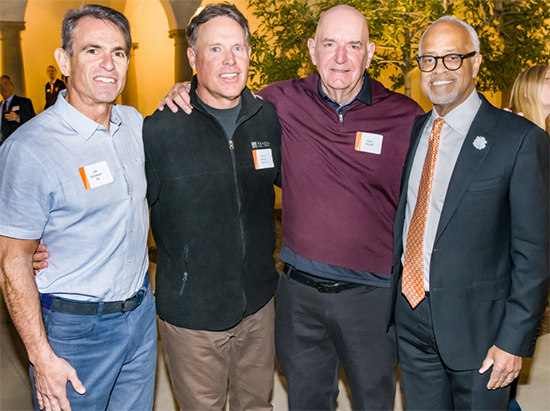
That was an incredibly difficult decision, and one that impacted many people. Last fall, we had a really good event to celebrate the legacy of Oxy football, with more than 80 players returning to campus along with Coach Dale Widolff. The feeling that night was great, and I don’t want to lose that energy or let them think that this is just a one-off. We are going to establish an archive and I intend to do that for the legacy of football at Oxy.
[Former players] Vance Mueller ’86 and Jeff Goldstein ’86 were very helpful in pushing the issue in different ways. And they are just great people. When I made the announcement that I was stepping down, Vance and Goldie were two of the first people I heard from.
If you were to direct another play, what would it be?
I would love to direct a student production of Hamilton, with a student artistic director. It’s not available yet for rights. So, it’s not something immediate.
Do you have a wish list of people who you would like to bring to campus?
We’re working with the Hameetman Career Center to set up a series featuring alumni talking about their post-Oxy life. If we were featuring artists, for instance, I’d want it to be something like “Art as My Occupation,” so students could see there’s a variety of careers in art other than just being an artist. We have alumni doing exciting work in all sorts of spaces.
Why not a Harry J. Elam, Jr. Alumni Speaker Series?
I would like that.
Have you given any thought to what you’ll say at Commencement next May?
Some ideas have flashed into my mind, but nothing concrete. Right now we’re trying to figure out who’s going to be the speaker. Coming in and going out with the Class of ’24, we’ve had some shared experiences.
Top photo: President Elam addresses a Thorne Hall audience for the inaugural talk in the Oxy Live! series on October 3.

